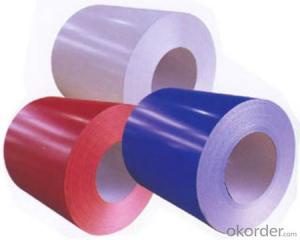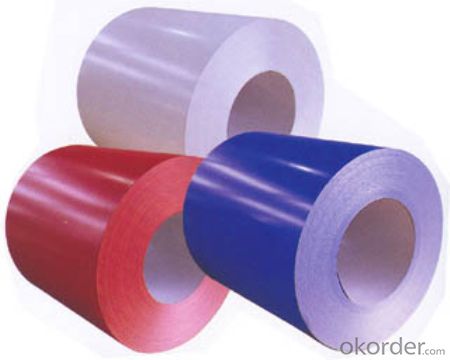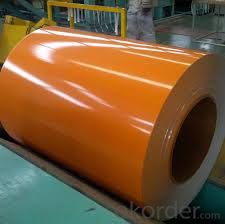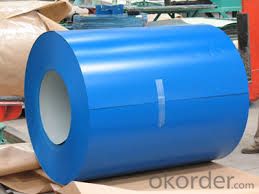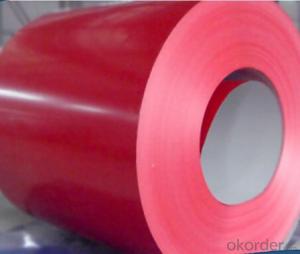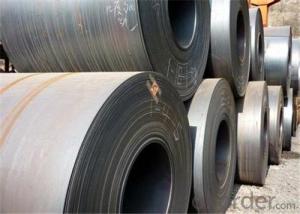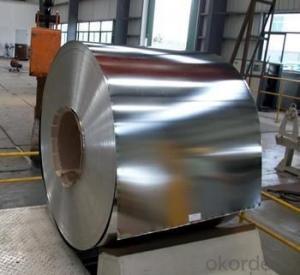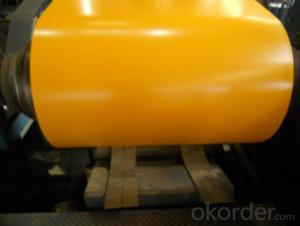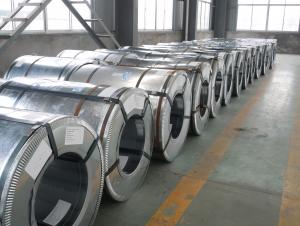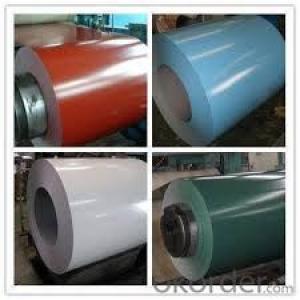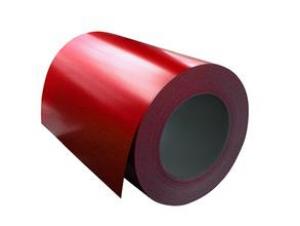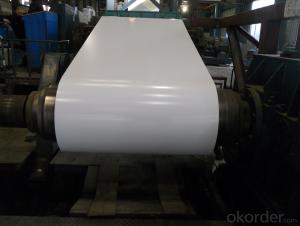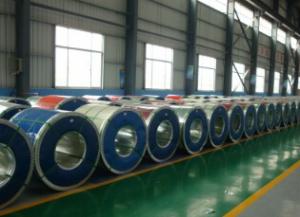Home Appliance Steel Sheet / Prepainted Galvanized Steel
- Loading Port:
- Shanghai
- Payment Terms:
- TT OR LC
- Min Order Qty:
- 25 m.t.
- Supply Capability:
- 12000 m.t./month
OKorder Service Pledge
OKorder Financial Service
You Might Also Like
Product Description
From China Manufacturer PPGI/PPGL Prepainted Galvanized Steel For Building Steel Material / Roofing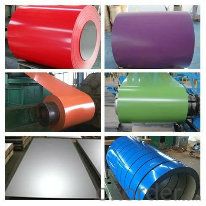
1) Price terms: CIF CFR FOB
2) Payment: T/T or L/C at sight
3) Shipping port: Qingdao China
4) Samples are available and free of charge
5) Coil ID : 508 / 610 MM
6) Packing: seaworthy packing
7) Delivery: about 10-15 days upon the day of deposit and L/C opening
Product | PPGI/PPGL | Galvanized | Galvalume/Aluzinc | |
Certificate | ISO9001,ISO14001 | |||
standard | ASTM A755 | ASTM A653 | ASTM A792 | |
Grade | CGCC/CGLCC | SGCC/CS/DX51D | SGLCC/CS/DX51D | |
Model | Thick:0.16-0.90mm | Thick:0.14-3.5mm | Thick:0.23-2.0mm | |
Type | Roll/Coil | Roll/Coil | Roll/Coil | |
surface | Protective | Chromating Treatment Oiled | ||
Application | Structural,Roofing,Commercial use,Household Appliance,Industry | |||
Special | Wear resistant steel,High-strength-steel plate | |||
Q&A Do you accept OA payment terms?
ANSWER: Yes, sure, but it normally depending on the order value
- Q: What are the different types of steel coil coatings?
- There are several different types of steel coil coatings, including galvanized, galvalume, pre-painted, and organic coatings.
- Q: What are the common methods of protecting steel coils from corrosion?
- There are several common methods used to protect steel coils from corrosion. 1. Coating: One of the most effective methods is to apply a protective coating on the surface of the steel coil. Various types of coatings such as paint, epoxy, or zinc can be used to create a barrier between the steel and the corrosive environment. These coatings provide excellent corrosion resistance and prevent moisture and oxygen from reaching the steel surface. 2. Hot-dip galvanizing: This method involves immersing the steel coil in a bath of molten zinc, which creates a thick layer of zinc coating on the surface. The zinc coating acts as a sacrificial barrier, protecting the steel from corrosion. Hot-dip galvanizing is particularly effective in harsh environments or for long-term outdoor exposure. 3. VCI (Volatile Corrosion Inhibitor) packaging: VCI packaging is a method where steel coils are wrapped in a specially designed film or paper that contains volatile corrosion inhibitors. These inhibitors vaporize and form a protective layer on the surface of the steel, preventing corrosion. VCI packaging is commonly used for short-term storage or transportation of steel coils. 4. Desiccants: Moisture is a major contributor to corrosion. Therefore, using desiccants such as silica gel or activated alumina can help absorb moisture and maintain a dry environment around the steel coils. Desiccants are often used in conjunction with other protective methods to enhance corrosion protection. 5. Proper handling and storage: Proper handling and storage practices can significantly reduce the risk of corrosion. Steel coils should be stored in a dry environment away from moisture sources. They should also be handled with clean gloves to prevent the transfer of corrosive contaminants. Regular inspection and maintenance of the storage area are essential to identify and address any potential corrosion risks. By employing one or a combination of these methods, steel coils can be effectively protected from corrosion, ensuring their durability and integrity.
- Q: What is the average price of a steel coil?
- The average price of a steel coil can vary depending on several factors such as the type of steel, the thickness and width of the coil, the market demand, and the location of purchase. Generally, the price can range from $500 to $1500 per metric ton. However, it is important to note that prices are subject to fluctuations in the steel market, which can be influenced by global economic conditions, trade policies, and supply-demand dynamics. Therefore, it is advisable to consult with steel suppliers or monitor market trends to get the most accurate and up-to-date pricing information.
- Q: How are steel coils used in the manufacturing of engine components?
- Steel coils are used in the manufacturing of engine components as they provide a strong and durable material for various parts. These coils are typically processed and shaped into specific components such as pistons, crankshafts, cylinder heads, and connecting rods, which are vital for the proper functioning of an engine. The high strength and heat resistance of steel make it an ideal choice for these critical components, ensuring the engine's reliability and performance.
- Q: Like 49ers. Pittsburgh have long history of steel industry?
- www.okorder A basement waterproofing New Jersey contractor is the one that you need to ensure that your entire home's foundation will not get damped with water and to avoid expensive repairs at the same time.
- Q: How are steel coils used in the food processing industry?
- Steel coils are commonly used in the food processing industry for various purposes. One primary application is in the production of food packaging materials, such as cans and containers. These coils are transformed into thin sheets or strips that are then formed into the desired shape and size for packaging different food products. Steel coils are also utilized in the manufacturing of equipment and machinery used in food processing plants. This includes machines like conveyors, mixers, and slicers, which are crucial for the efficient and automated processing of food products. The durability and strength of steel make it an ideal material for these types of equipment, as it can withstand heavy usage and maintain its structural integrity. In addition, steel coils are used in the construction of storage and refrigeration facilities within the food processing industry. These coils are transformed into durable and insulated panels that are used to create walls and ceilings of cold rooms, freezers, and warehouses. The excellent thermal properties of steel help maintain the desired temperature and prevent spoilage of perishable food items. Furthermore, steel coils are employed in the production of cooking and baking equipment, such as ovens and grills. These coils are transformed into heating elements that provide consistent and efficient heat distribution during the food preparation process. This ensures that food is cooked or baked evenly, resulting in high-quality and delicious products. Overall, steel coils play a vital role in the food processing industry by providing the necessary materials for packaging, equipment, and infrastructure. Their strength, durability, and thermal properties make them a preferred choice for various applications within this industry, ensuring the production of safe and high-quality food products.
- Q: How do steel coils contribute to strength and stability in structures?
- Steel coils contribute to strength and stability in structures due to their inherent properties. The coils are made of high-strength steel, which provides excellent tensile strength and resistance to deformation. When used in structural components such as beams, columns, or foundation systems, steel coils reinforce the structure and help distribute loads evenly, enhancing its overall strength and stability. The flexibility and durability of steel coils also enable structures to withstand external forces, such as wind or seismic loads, without significant deformation or failure.
- Q: What are the surface treatments for steel coils?
- Some common surface treatments for steel coils include galvanizing, painting, and coating. These treatments are applied to protect the steel from corrosion, improve its appearance, and enhance its durability.
- Q: I am planning to buy a Walther P22. I have liked the Pistol's performance-superb.The only confusion that I have is about the Polymer Frame.Just for this I may shift to someother manufacturer.Are Polymer Frames better than Steel in durability and lifespan.Walther says YES.Any comments on this...Practical users...Thanks in advance
- All polymer frames are cast around steel 'skeleton' inserts, which bear the stress and wear between receiver slide, as well as other wear points. The great advantage to polymer frames is the lower weight over the polymer composite compared to an all-steel or other metal alloy receiver frame. As all wear contact points are 'steel-to-steel', the service life expectancy of a polymer-frame weapon will be the same as an all-steel frame design. NO polymer-frame design I know of has ANY stress or load contact points between metal and polymer-only surfaces. My polymer-frame H-K USP and my Glocks are constructed this way.
- Q: How are steel coils used in the manufacturing of construction materials?
- Steel coils are used in the manufacturing of construction materials as they are rolled into sheets or strips, which can then be shaped and formed into various structural components such as beams, columns, and frames. These coils provide the necessary strength and durability required for constructing buildings, bridges, and other infrastructure projects.
Send your message to us
Home Appliance Steel Sheet / Prepainted Galvanized Steel
- Loading Port:
- Shanghai
- Payment Terms:
- TT OR LC
- Min Order Qty:
- 25 m.t.
- Supply Capability:
- 12000 m.t./month
OKorder Service Pledge
OKorder Financial Service
Similar products
Hot products
Hot Searches
Related keywords
